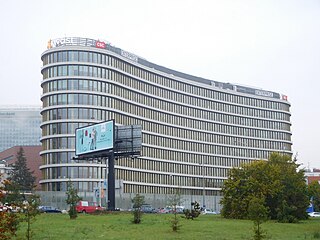
AOL is an American web portal and online service provider based in New York City, and a brand marketed by Yahoo! Inc.

McAfee Corp., formerly known as McAfee Associates, Inc. from 1987 to 1997 and 2004 to 2014, Network Associates Inc. from 1997 to 2004, and Intel Security Group from 2014 to 2017, is an American global computer security software company headquartered in San Jose, California.

Antivirus software, also known as anti-malware, is a computer program used to prevent, detect, and remove malware.

Citrix Systems, Inc. is an American multinational cloud computing and virtualization technology company that provides server, application and desktop virtualization, networking, software as a service (SaaS), and cloud computing technologies. Citrix claims that their products are used by over 400,000 clients worldwide, including 99% of the Fortune 100 and 98% of the Fortune 500.

Gen Digital Inc. is a multinational software company co-headquartered in Tempe, Arizona and Prague, Czech Republic. The company provides cybersecurity software and services. Gen is a Fortune 500 company and a member of the S&P 500 stock-market index. The company also has development centers in Pune, Chennai and Bangalore. Its portfolio includes Norton, Avast, LifeLock, Avira, AVG, ReputationDefender, and CCleaner.

CA Technologies, Inc., formerly Computer Associates International, Inc., and CA, Inc., was an American multinational enterprise software developer and publisher that existed from 1976 to 2018. CA grew to rank as one of the largest independent software corporations in the world, and at one point was the second largest. The company created systems software that ran in IBM mainframe, distributed computing, virtual machine, and cloud computing environments.
In computer security, a sandbox is a security mechanism for separating running programs, usually in an effort to mitigate system failures and/or software vulnerabilities from spreading. The sandbox metaphor derives from the concept of a child's sandbox—a play area where kids can build, destroy, and experiment without causing any real-world damage. It is often used to execute untested or untrusted programs or code, possibly from unverified or untrusted third parties, suppliers, users or websites, without risking harm to the host machine or operating system. A sandbox typically provides a tightly controlled set of resources for guest programs to run in, such as storage and memory scratch space. Network access, the ability to inspect the host system, or read from input devices are usually disallowed or heavily restricted.

Avast Software s.r.o. is a Czech multinational cybersecurity software company headquartered in Prague, Czech Republic, that researches and develops computer security software, machine learning, and artificial intelligence. Avast has more than 435 million monthly active users and the second largest market share among anti-malware application vendors worldwide as of April 2020. The company has approximately 1,700 employees across its 25 offices worldwide. In July 2021, NortonLifeLock, an American cybersecurity company, announced that it was in talks to merge with Avast Software. In August 2021, Avast's board of directors agreed to an offer of US$8 billion.

Marc Canter is an American internet entrepreneur, speaker, technology evangelist and early pioneer of online software, and is often called the "godfather of multimedia". Canter is a CEO of Instigate, Inc. Marc is best known for being the co-founder and CEO of MacroMind, the company that became Macromedia.

Julian Lombardi is an American inventor, author, educator, and computer scientist known for his work with socio-computational systems, scalable virtual world technologies, and in the design and deployment of deeply collaborative virtual learning environments.
Webroot Inc. is an American privately-held cybersecurity software company that provides Internet security for consumers and businesses. The company was founded in Boulder, Colorado, US, and is now headquartered in Broomfield, Colorado, and has US operations in San Mateo and San Diego, and globally in Australia, Austria, Ireland, Japan and the United Kingdom.

Bitdefender is a Romanian cybersecurity technology company headquartered in Bucharest, Romania, with offices in the United States, Europe, Australia and the Middle East.

VirusTotal is a website created by the Spanish security company Hispasec Sistemas. Launched in June 2004, it was acquired by Google in September 2012. The company's ownership switched in January 2018 to Chronicle, a subsidiary of Google.

AVG Technologies is a brand of cybersecurity, privacy, performance and utility software applications for desktop computers and mobile devices developed by Avast, a part of Gen Digital. AVG was a cybersecurity software company founded in 1991 and it merged into Avast following an acquisition in 2017. It typically offers freeware, earning revenues from advertisers and from users that upgrade to paid versions for access to more features.
Turbo is a set of software products and services developed by the Code Systems Corporation for application virtualization, portable application creation, and digital distribution. Code Systems Corporation is an American corporation headquartered in Seattle, Washington, and is best known for its Turbo products that include Browser Sandbox, Turbo Studio, TurboServer, and Turbo.
Google Native Client (NaCl) is a discontinued sandboxing technology for running either a subset of Intel x86, ARM, or MIPS native code, or a portable executable, in a sandbox. It allows safely running native code from a web browser, independent of the user operating system, allowing web apps to run at near-native speeds, which aligns with Google's plans for ChromeOS. It may also be used for securing browser plugins, and parts of other applications or full applications such as ZeroVM.

Malwarebytes Inc. is an American Internet security company that specializes in protecting home computers, smartphones, and companies from malware and other threats. It has offices in Santa Clara, California; Clearwater, Florida; Tallinn, Estonia; Bastia Umbra, Italy; and Cork, Ireland.

Unity Software Inc. is an American video game software development company based in San Francisco. It was founded in Denmark in 2004 as Over the Edge Entertainment and changed its name in 2007. Unity Technologies is best known for the development of Unity, a licensed game engine used to create video games and other applications.
Neverware Inc was a New York–based technology company and a subsidiary of Google.
Randy Komisar is an American technology attorney, executive, and author living in Silicon Valley, California. Komisar is the co-founder of Claris, former CEO of Lucas Arts Entertainment, Chief Financial Officer of GO Corp, and the "virtual CEO" of TiVo.













